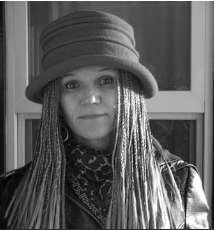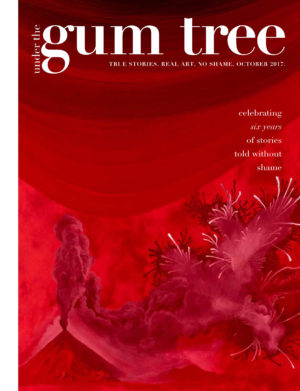Deborah Meltvedt

Time for a throw back to our premiere issue. Deborah Meltvedt’s story “Things I Left Behind” was in that first issue back in August 2011, and her story “Hitting the Wall is in the current issue. If you tuned in for our two-year anniversary reading this past November, you might recognize her. Deborah is a medical science teacher and program director at a small, public high school in Sacramento. She loves to blend health education and creative writing, not only in her own pieces, but also in the imaginations of her high school students.
Here’s a short excerpt from her piece “Things I Left Behind”. . .
“There was a time I used to leave things behind: embroidered sweaters, letters in manila envelopes, presents wrapped in flower paper. I abandoned them everywhere – on second story balconies, in the back seats of other people’s cars, and, more than once, on the platform of a train station, where a small suitcase would sit, cast off and weathering, in the hot sun of a California afternoon.”
When and why did you start writing?
I remember in fourth grade watching an episode of Bonanza in which some horrific injustice happened to Little Joe or an Indian friend or maybe even Little Joe’s horse. Anyway, I was devastated and didn’t know what to do with my feelings that night. So I wrote a poem and taped it to my bedroom door. My mom kept it forever; it was awful. But it was the first time I figured out what to do with helplessness and anger, especially towards acts of cruelty. I could write about it and I’ve never stopped.
What do you enjoy most about writing?
Well, not so much about 1960 television shows anymore; but I do like trying to figure out why awful things happen and how individuals deal with injustice and sadness all around them. I like to write about trying to make sense of things that are beyond comprehension. To use the term “enjoy” doesn’t always seem right, but I am more compelled to write about the closeness of love and death and sadness and vulnerability that happens all around me. This might be about the couple who don’t talk on the bar stools next to me in a pub to watching my mother go through a horrible illness and death. Writing for me has to have a bigger picture or “statement” behind it. Although sometimes I should just learn to write happy poems about gardens or clouds or falling in love.
Who or what is your biggest inspiration when you write?
Damn, I hate this question. It depends. I have to admit, a lot of times it is my husband, he is often the “audience” I write to. But probably my biggest inspiration are the voices that “talk” to me in memory, telling me to explain the small world we live in. It might be my sixth grade teacher or best friend from Kindergarten or my sister who was the bravest in our crazy household growing up. It is anybody who tells me there is a reason I have memory and can’t forget, and need to let somebody know. But if I were to name one person in the literary world who has inspired me to keep writing, that my writing is important, it is my mentor Jan Haag at Sacramento City College. That woman rocks in terms of inspiration. Oh, and the world of injustice, don’t you think? Reading about elephants dying for ivory to anti-birth control legislation to killings in Kenya–all of it makes me want to write. When you are helpless, you can pick up a pen at least.
Do you have a writing schedule?
I don’t. I am not that disciplined, but mostly I write when somebody gives me prompts or deadlines. Or I hear something on NPR or there is a great line of dialogue at the gym or in my classroom. Having said that, I think I need to take a class again. But I have learned that prompts are everywhere to get me started: in writing group, at bars, sitting at home when my husband makes me dinner, he gives me a prompt.
What is the hardest part of writing for you?
Dialogue and plot. I am good at observation and I am good at connecting dots to make a point, to weave in themes and even make people cry. But plot eludes me. Luckily, for the most, plot just happens.
How long does it usually take you to finish a story?
For nonfiction memoir it may only take an afternoon or a few days. But for fiction, it can be anywhere from weeks to. . . never. Again, it depends on deadlines.
Are you working on anything now?
Always. I wish I had a “novel” in me. I am hoping it magically appears in some sort of voice knocking at my door with an envelope saying “here is the theme and plot you have been waiting all of your life to deliver.” But, no. What I am really working on is revising about 8 to 10 short stories for a possible collection some day. And poems, always poems.
How many rejections did you get before you had something published? How did you deal with them?
I haven’t had many rejections because I haven’t sent out much work. The first “real” submission I did was with the American River Literary Review and luckily I got accepted. This was in the 1990s and I was already an adult teaching high school and giving writing another chance. Since then, I have entered different writing contests and sent in short stories and I think I almost expect to get rejected. Most of my friends are pretty upset with this attitude.
How did you celebrate when you got your first acceptance?
Hmm, don’t remember unless you count Diet Dr. Pepper and a Hershey Bar in seventh grade when my first short story appeared in the Wawona Wild Cat Newsletter in Fresno. Otherwise, I celebrate by telling my husband and him telling me how good a writer I am and me never believing it.
Do you prefer typing or pencil to paper when you write?
Both. I have found with prompts in writing group, that a journal and pen is the best way to write a first draft, I don’t “edit” so much. I have read where writing by hand does something different to the brain, engages the whole body experience of creativity. I really like that. I prefer typing when I am by myself and when I edit a piece. I also sometimes prefer writing with coffee and other times with wine. Depends on the mood.
What do you do when you’re not writing?
Think about when am I going to have time to write? That actually is true. But most of my time is taken up with teaching. I am a Medical Science Instructor for a small, public school called Health Professions High School in Sacramento Unified School District. My week days and weekends are full of lesson planning, researching, grading papers, and working with wonderful students who teach me more than I teach them. I also am the Senior Project Advisor and Creative Writing Club Advisor in which we work closely with the non-profit 916Ink Literacy organization to help students publish their creative writing. At Health Professions we have published three books so far based on creative writing and medicine. Besides teaching and writing, I love traveling with my husband, Rick Kushman; running; and watching re-runs of West Wing, the best show ever on television.
Who is your favorite author?
I have many, but Alice Munro is the best short story writer ever. She has the brilliance of making the reader care about an ordinary yet obscure character without being sentimental. And Emily Dickinson. Sometimes I have no idea what she is writing about, but since about seventh grade when I started reading her poems on my own, I fell in love with the language and the humanity of her words. And I have to add Ernest Hemingway, not my complete favorite, but I love most of his short stories and we share the same birthday (July 21).
What are some of your favorite books?
I usually like books that make me care about the characters despite flaws and are realistic. Also, they need to have a moral code is not traditional, but I love books about survival in extreme and ordinary ways, but not futuristic, dystopia ones. I also am a sucker for “coming of age” novels and for works that blend quiet feminism with good story telling.
Some of my favorites:
Poisonwood Bible by Barbara Kingsolver
(my favorite recent one) The Yonahlossee Riding Camp for Girls by Anton DiSclafani
The Bluest Eye and Mercy by Toni Morrison
ALL Short Stories by Alice Munroe
The Grass is Singing by Doris Lessing
Disgrace by J.M. Coetzee
Sophie’s World (fun, fun way of exploring philosophers) by Jostein Gaarder
A Tree Grows in Brooklyn by Betty Smith
Cider House Rules by John Irving
Sport of Nature by Nadine Gordimer
Member of the Wedding by Carson McCullers
A Son Also Rises by Hemingway
Do you have any advice for other writers?
I tell my students to find their own voice and don’t over edit. I am a firm believer in the Amherst Writers Artist practice in which you write freely on the first draft and only receive supportive praise until you are ready for a second draft. Also, to read what you love.
Is there anything else you would like to share with the readers?
This is the best part of writing for me now: Pour a glass of wine, have a bite of cheese, and let your husband make you dinner and give you a prompt. I am so lucky that my husband indulges me this way: He cooks and I write and then he listens to my stories. Very Out of Africa-esque. On those moments, we are both doing what we love.




